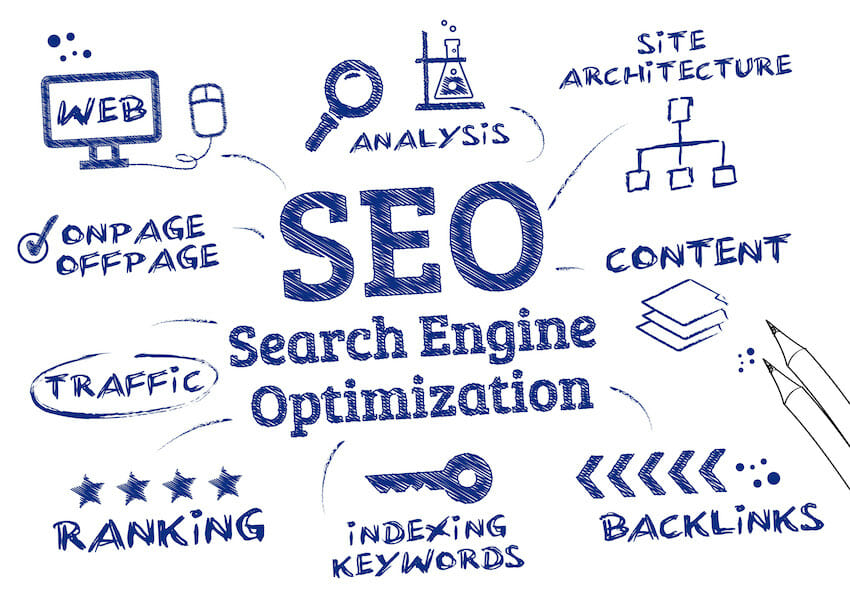
Reach out, and I'll respond promptly.


Search Engine Optimization (SEO) is the practice of optimizing your website to rank higher in search engine results pages (SERPs) such as Google, Bing, and Yahoo. In simple terms, it's the art of making sure your website appears as close to the top of the search results as possible when searching for products, services, or information related to your business using keywords.
SEO can seem like a daunting task, especially for beginners. But fear not! In this article, we'll be breaking down the basics of SEO into easily digestible chunks. Then, we'll cover how search engines work, the different types of optimization you should be aware of, and the tools and metrics you can use to track your progress. By the end of this article, you'll have a solid foundation for understanding and implementing SEO on your website.
Remember that this is a beginner's guide, and the topics and information will be simplified. However, I will write more guides in the future that will delve much deeper into search engine optimization. So, let's optimize your website for better search engine rankings!
Search engines like Google, Bing, and Yahoo are the internet's gatekeepers. They're responsible for ensuring that when you type "best pizza place in town" into the search bar, you're presented with a list of relevant websites that might answer your question. But how do they do it? How do they decide which websites should be at the top?
The answer lies in search engine algorithms. These are complex mathematical formulas that search engines use to analyze and rank websites based on various factors, such as the relevance and quality of the content, the number and quality of inbound links, and the site's overall structure and technical performance.
One of the most important factors that search engines consider when ranking websites is using keywords. When you create a website, you need to think about the words and phrases people might use when searching for the products, services, or information your site offers. These words and phrases are known as keywords and play a crucial role in SEO. We'll do a deep dive into keyword research, the SEO tools involved, and best practices in later guides.
When a search engine crawls a website, it scans its content, meta tags, schema, and other information to understand the site. If the site uses keywords that match the search query, it's more likely to be considered relevant and rank higher in the search results. That's why using keywords in your website's content, meta tags, and other elements is so important. However, avoid keyword stuffing, as Google and other search engines can pick up on this and reduce your rankings or de-list your website altogether.
Note: There are a ton of keywords and keyword combinations you can use for on-page SEO and increase traffic to your website. Keyword research is imperative in determining what keywords or phrases (Long-Tails) could and should be used on each page of your site. Try not to overstuff your keywords and write in clear and concise sentences. This is primarily what Google and other search engines are looking for.
On-page optimization ensures that your website is tip-top so that search engines can easily understand what it's about and rank it accordingly. It's a crucial aspect of SEO because it helps search engines understand the relevance and quality of your website's content, and it also helps to ensure that your website is user-friendly.
One of the most important elements of on-page optimization is ensuring that your website's content and meta tags are optimized for SEO. This means that you must ensure that your website's pages use keywords relevant to the page's content and that the meta tags accurately describe the page's content. Doing this could improve your website's search engine rankings for those keywords.
Meta tags are HTML tags that provide metadata about a web page. They are placed in the head section of a web page's HTML code and are used by search engines and browsers to understand the content and purpose of the page. Some common types of meta tags include the title tag, which defines the page's title, and the meta description tag, which provides a summary of the page's content.
Schema markup is a type of microdata that is added to the HTML code of a web page to provide more information about the page's content to search engines. It creates "rich snippets" in search results, including product prices, ratings, and other information that can help a page stand out in search results. Schema markup is also used to help search engines understand the context of a page's content, such as an article, an event, a recipe, or a product, which can help improve a site's search visibility.
Another important aspect of on-page optimization is creating high-quality content optimized for search engines. Therefore, you must ensure that your website's content is well-written, informative, and engaging. And you also need to make sure that you're using keywords in your content in a natural and not forced way. While it may be time-consuming, doing this for every page of your website will help increase your SEO success and show Google that you're serious about your website, its content, and your rankings.
Off-page optimization is all about building and maintaining relationships with other websites. It's about getting other websites to link to your website, and it's also about making sure that your website is linked to reputable sites. In other words, off-page optimization is all about building links to and from your website.
While not technically considered off-page optimization, internal linking is still crucial to your off-page optimization tactics. Internal linking is the practice of linking to other pages on your website, and it's important because it helps search engines understand the structure of your website. It can also serve as a way for search engines to find other content within your website. It'll also help visitors navigate your website more easily.
The most important aspect of off-page optimization is building quality inbound and outbound links. Inbound links are links that point to your website from other websites, and outbound links are links that point from your website to other websites. Both links are essential for SEO because they help search engines understand the relevance and authority of your website.
Social media also plays a vital role in SEO. It provides an avenue for promoting your website and driving traffic and also plays a crucial role in improving your search engine rankings. By actively sharing and promoting your content on various social media platforms, you send a clear signal to search engines, known as social signals, that your website is active and relevant. This, in turn, positively impacts your search engine rankings and is an essential aspect of any comprehensive SEO strategy.
Off-page optimization is the process of building and maintaining relationships with other websites. It helps search engines understand the relevance and authority of your website, and it also helps visitors navigate your website more easily. By following best practices for internal linking, building quality inbound and outbound links, and using social media to promote your website, you could improve your website's search engine rankings and attract more visitors.
Technical SEO ensures that your website's code and structure are optimized for search engines and is a basic SEO technique that can significantly impact your SEO efforts. It's about ensuring that your website is easy for search engines to crawl and index and that your website's code and structure are clean and organized. Optimizing a website is a critical SEO technique and will help Google rank your site higher, but it can also aid in retaining visitors to your website. According to Google, a website should load in under 3 seconds, as research shows that 53% of visitors will leave a mobile site if it takes longer than 3 seconds to load.
Several free SEO web-based tools can be used to scan your website and determine if there are any technical SEO issues present and how to resolve them.
Another important aspect of technical SEO is ensuring your website's loading speed is fast. Search engines prefer websites that load quickly because they provide a better user experience. Suppose you aren't able or don't know how to do this aspect of technical SEO. In that case, there are many step-by-step guides for SEO beginners, or hiring a company specializing in website optimization would be suggested.
Measuring and tracking your SEO progress is crucial to know if your efforts are paying off. It allows you to see which of your strategies are working and which aren't and helps you identify areas where you need to improve.
Google Search Console is one of the most essential tools for analyzing your website's search engine rankings. It gives you insight into how Google crawls and indexes your website and provides information about your website's search engine rankings. It can also provide insight into any errors or issues you may need to be aware of with your website.
Google Analytics is another critical tool for measuring and tracking your SEO progress. It provides you with information about the traffic that your website is receiving, and it also helps you understand how visitors interact with your website. Using this information, you can make data-driven decisions about improving your website's SEO or the content you provide.
Measuring and tracking your SEO progress is crucial to understanding if your efforts are paying off. Using tools like Google Search Console and Google Analytics can gain valuable insights into your website's search engine rankings and visitor behavior. You can make data-driven decisions about improving your website's SEO using this information.
Note: Doing anything with your website without proper data tracking wastes time. Tracking your website's data and SEO results is like regularly checking and maintaining a car. Without monitoring, you're blindly making adjustments without knowing their impact. Use tools like Google Analytics and Search Console, just like a mechanic uses diagnostic tools, to make informed decisions on optimizing and improving your website's performance.
In this introductory SEO guide, we've covered the basics of SEO for beginners. In addition, we've discussed how search engines work, the importance of on-page and off-page optimization, the role of technical SEO, and the importance of measuring and tracking your results. By following the tips and strategies outlined in this guide, you could be on your way to optimizing your website for search engines and improving your website's rankings.
SEO is constantly changing, Google is always adjusting its algorithms, and website software is continuously updating. So, staying up-to-date with search engine optimization best practices and SEO basics should be the #1 part of any SEO strategy. Something that worked today may not work tomorrow, and something that didn't work yesterday may work today.
Now that you have a solid understanding of the basics of SEO, whether you're new to SEO or a seasoned expert, it's time to take action and start implementing these strategies on your website. Remember that SEO is a long-term game, and the results may take time. Still, by consistently implementing these strategies, you'll see an improvement in your website's search engine rankings and organic traffic.
So, don't wait any longer.